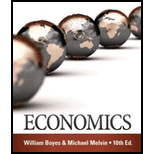
The role of aggregate demand and the effect of
Explanation of Solution
A sum of supply of goods and services that firms in an economy plan to trade during a precise time episode is called
Aggregate supply is not exaggerated by the change in fiscal policy, expecting a superior change in real Gross Domestic Product by the examination of government expenditure and
The difference between potential Gross Domestic Product and the equilibrium level Gross Domestic Product is known as the Gross Domestic Product gap.
The utmost point of real Gross Domestic Product that can be persistent over the elongated term is known as potential Gross Domestic Product. When aggregate supply and aggregate demand are equal it is said to be equilibrium level Gross Domestic Product.
The Gross Domestic Product Gap is the gap between the real entire output and the potential entire output.
Want to see more full solutions like this?
- The preferences of a consumer are represented by the following utility function: U = min (×1, 2x2) If income is 100 and p1=p2=1 a) What is the optimal bundle? b) If p₁=4, what is the new optimal bundle? c) If p2=4, what is the new optimal bundle? d) Decompose the price effect into income and substitution effect and provide a graphical representation of your results.arrow_forwardChallenges of Nepal's foreign trade.arrow_forwardSolarrow_forward
- The answer is not Carrow_forwardSocial capital includes: a) labour, produced capital, and natural capital. b) human capital, physical capital, and natural resources. c) labour, physical capital, and human capital. d) labour, physical capital, and produced capital.arrow_forwardGeneral Accounting Question solution and give me Blank ? Carrow_forward
- It is possible to use transformational leadership strategies to reach unethical objectives. Traditional leadership theories and morals standards are not adequate to help employees solve complex organizational issues. For the statement above, argue in position for both in favor or opposed to the statements.arrow_forwardDiscuss the preferred deterrent method employed by the Zambian government to combat tax evasion, monetary fines. As noted in the reading the potential penalty for corporate tax evasion is a fine of 52.5% of the amount evaded plus interest assessed at 5% annually along with a possibility of jail time. In general, monetary fines as a deterrent are preferred to blacklisting of company directors, revoking business operation licenses, or calling for prison sentences. Do you agree with this preference? Should companies that are guilty of tax evasion face something more severe than a monetary fine? Something less severe? Should the fine and interest amount be set at a different rate? If so at why? Provide support and rationale for your responses.arrow_forwardanswerarrow_forward
- Discuss the preferred deterrent method employed by the Zambian government to combat tax evasion, monetary fines. As noted in the reading the potential penalty for corporate tax evasion is a fine of 52.5% of the amount evaded plus interest assessed at 5% annually along with a possibility of jail time. In general, monetary fines as a deterrent are preferred to blacklisting of company directors, revoking business operation licenses, or calling for prison sentences. Do you agree with this preference? Should companies that are guilty of tax evasion face something more severe than a monetary fine? Something less severe? Should the fine and interest amount be set at a different rate? If so at why? Provide support and rationale for your responses.arrow_forwardNot use ai pleasearrow_forwardFor the statement below, argue in position for both in favor or opposed to the statement. Incompetent leaders can't be ethical leaders. Traditional leadership theories and moral standards are not adequate to help employees solve complex organizational issues.arrow_forward
 Exploring EconomicsEconomicsISBN:9781544336329Author:Robert L. SextonPublisher:SAGE Publications, Inc
Exploring EconomicsEconomicsISBN:9781544336329Author:Robert L. SextonPublisher:SAGE Publications, Inc
 Economics (MindTap Course List)EconomicsISBN:9781337617383Author:Roger A. ArnoldPublisher:Cengage Learning
Economics (MindTap Course List)EconomicsISBN:9781337617383Author:Roger A. ArnoldPublisher:Cengage Learning
 Macroeconomics: Private and Public Choice (MindTa...EconomicsISBN:9781305506756Author:James D. Gwartney, Richard L. Stroup, Russell S. Sobel, David A. MacphersonPublisher:Cengage Learning
Macroeconomics: Private and Public Choice (MindTa...EconomicsISBN:9781305506756Author:James D. Gwartney, Richard L. Stroup, Russell S. Sobel, David A. MacphersonPublisher:Cengage Learning Economics: Private and Public Choice (MindTap Cou...EconomicsISBN:9781305506725Author:James D. Gwartney, Richard L. Stroup, Russell S. Sobel, David A. MacphersonPublisher:Cengage Learning
Economics: Private and Public Choice (MindTap Cou...EconomicsISBN:9781305506725Author:James D. Gwartney, Richard L. Stroup, Russell S. Sobel, David A. MacphersonPublisher:Cengage Learning





